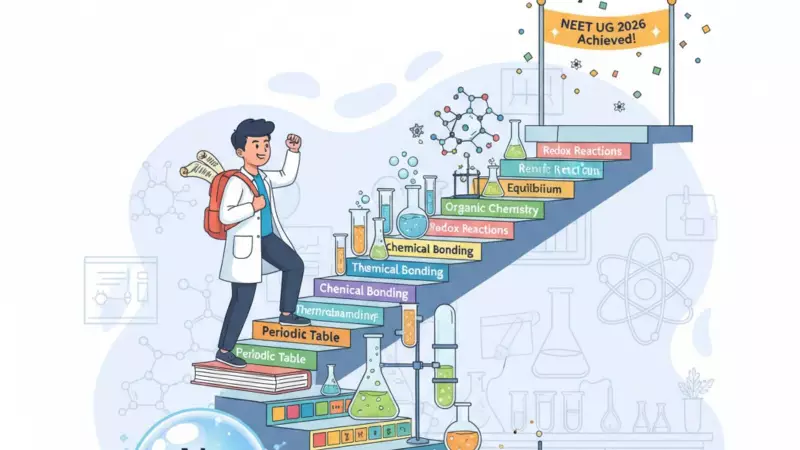
For every NEET UG 2026 aspirant, finding a subject that feels manageable is a secret hope. Chemistry often emerges as that balanced middle path—less formula-intensive than Physics and not as overwhelmingly vast as Biology. However, this perception comes with a crucial caveat: Chemistry demands clarity, unwavering consistency, and a calm approach. Master these, and it becomes your most reliable scoring subject. Neglect them, and it can present unexpected challenges in the crucial NEET exam hall.
The Three Pillars of Chemistry for NEET UG 2026
Think of the Chemistry syllabus as a well-composed trio, each with its distinct character. Physical Chemistry is sharp and logical, constantly engaging your analytical thinking. Inorganic Chemistry is precise and detail-oriented, where every minor fact holds significance. Meanwhile, Organic Chemistry is the intriguing puzzle, seemingly complex at first but becoming deeply satisfying once you grasp the flow of its reactions.
The key to conquering Chemistry lies in giving each of these three branches the right amount of attention. Overemphasizing one at the expense of others can disrupt your preparation balance. But when you skillfully blend logical application, diligent memorization, and conceptual understanding, Chemistry transforms into a subject you can not only enjoy but also excel in.
Mastering Physical Chemistry: The Logic Game
Physical Chemistry operates like a strategic game where rules, practice, and focus are paramount. Here, formulas are your essential tools, and numerical problems are your training arena.
Create a dedicated formula notebook and revise it daily. The goal is not just rote memorization but understanding the underlying principle of each formula.
Regularly practice examples from both the NCERT textbook and your coaching modules. This builds both accuracy and the confidence to tackle any problem.
Critical chapters to master include Thermodynamics, Electrochemistry, Chemical Equilibrium, Solutions, and Chemical Kinetics.
A pro tip from experts: After solving a numerical, take a moment to ask yourself if you understood the core logic. If the answer is no, spend a few minutes revisiting the fundamental concept.
Conquering Inorganic Chemistry: The Art of Precision
Inorganic Chemistry is a test of your observation skills and patience. The smallest detail can easily form the basis of an exam question.
Read the NCERT textbook line by line. Every trend, exception, and colour change mentioned is potential fodder for a question.
Prepare concise summary sheets for important topics like oxides, chlorides, and oxidation states. These are invaluable for quick revisions before tests.
Focus your efforts on chapters like the Periodic Table, Chemical Bonding, Coordination Compounds, p-block elements (particularly groups 13 to 18), and Salt Analysis.
A highly effective strategy is to create tables and highlight key points. This method of visual learning helps your brain retain complex patterns and relationships more efficiently.
Decoding Organic Chemistry: The Reaction Detective
Approaching Organic Chemistry is like unraveling a mystery. Every reaction has a reason, and every mechanism tells a story.
Your foundation must be rock-solid. Begin with a thorough understanding of basic concepts such as the Inductive Effect, Resonance, and Hyperconjugation. Clarity here makes advanced topics significantly easier.
Prepare detailed reaction flowcharts to visually connect one concept to the next, seeing the bigger picture.
Consistently practice questions on reaction mechanisms and named reactions.
Important chapters include General Organic Chemistry (GOC), Hydrocarbons, Alcohols, Phenols, Ethers, Aldehydes, Ketones, Carboxylic Acids, Biomolecules, and Methods of Separation and Purification.
The ultimate pro tip: Don't just learn what happens in a reaction. Focus intensely on why it happens. This simple shift in perspective makes all the difference.
The NEET UG 2026 Revision Strategy
Revision is the critical process that turns raw information into lasting memory. It's not about marathon study sessions, but rather about consistent, scheduled revisiting of concepts.
Dedicate your weekends to revising key summary pages from the NCERT. Take short chapter-wise tests immediately after finishing each topic to cement your learning.
Maintain a separate notebook for mistakes you make during practice. Reviewing this weekly is a powerful habit that prevents you from repeating errors in the actual exam.
Furthermore, mock tests are non-negotiable. They are essential for developing effective time management skills and the right exam temperament.
Common Pitfalls to Avoid in Your NEET UG 2026 Journey
Experts strongly advise steering clear of these common traps:
Do not skip the NCERT textbook, especially for Inorganic and Organic Chemistry. It is the definitive guide for the exam.
Avoid memorizing reactions without understanding their mechanisms. This is a superficial approach that will fail under pressure.
And importantly, do not postpone Physical Chemistry until the final weeks. It demands consistent practice and respect over time.
Ultimately, success in Chemistry for NEET UG 2026 is not about luck; it's about a disciplined method. The deeper your understanding, the more patterns you will recognize. The subject will gradually lose its intimidation factor. Keep your concepts crystal clear, practice diligently every day, and revise intelligently. Chemistry does not demand perfection, only persistent effort. When you enter the NEET exam hall, remember you are not merely solving questions—you are connecting ideas, much like a chemist connects atoms. Do this with focused determination, and you will find that success was always a part of your equation.





